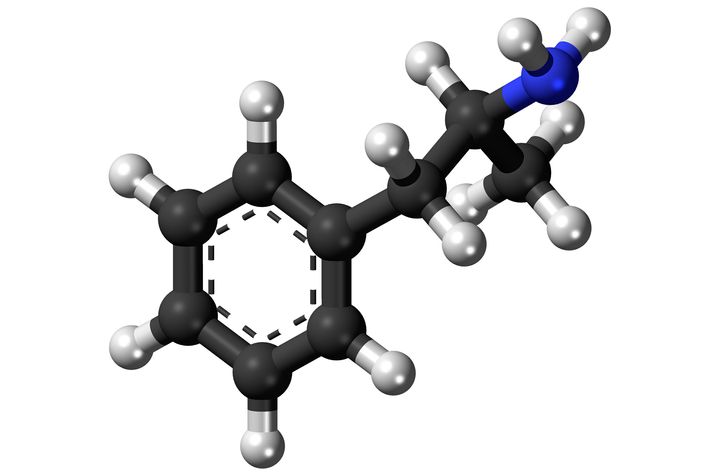
Amphetamines are as American as baseball, mom, and apple pie. Discovered by Californian chemist Gordon Alles in 1929, they helped fuel the U.S. Air Force victory over the German Reich, inspired the Beat poets, and helped Cold War housewives keep their girlish figures. Today, they keep ADD-diagnosed children and adults on task. And, needless to say, millions take the drugs for strictly recreational purposes. Whether marketed under the name Adderall, Vyvanse, Focalin, Concerta, or Benzedrine, 211 tons of the stuff is churned out of our factories every year — 70 percent of total worldwide production.
Why do we find this class of drugs so appealing? The reason lies deep in our evolutionary roots. Amphetamines mirror the effect of noradrenaline, the chemical that our brain releases in the throes of the fight-or-flight response. This ancient suite of reactions readies the body for intense physical activity: The heart races, blood pressure goes up, and energy reserves are metabolized. The brain girds for action, too. Memories become sharper, pain becomes dulled, sleepiness vanishes, and the ability to focus becomes intensified.
Psychologists call the perception of importance “salience.” Things that are salient are the things we want to pay attention to. When you’re lying in a hammock with a piña colada, nothing is particularly salient. Your attention drifts to the sound of the waves, the feeling of the breeze, the sound of the ukulele player. When a lion jumps out of the bushes in front of you, on the other hand, one thing is suddenly extremely salient. Your brain needs to focus on that one thing. And the fight-or-flight response makes it easy to do that, through an effect called “cognitive tunneling.” Essentially, you’re looking at the world through a very narrow tube.
Because amphetamines artificially activate this same mental machinery, they effectively allow us to put cognitive tunneling in a pill. It becomes effortless to focus on stuff that, by its own calculations, your brain wouldn’t find salient at all. Say you’ve been driving your semitruck cross-country all day, and now it’s the middle of the night and you’re tired. Your brain wants to pull over and get some shut-eye, but you need to get to Tulsa by dawn, so you pop some bennies and your focus is lasered back in on that yellow line. Or maybe you’re feeling restless because it’s a beautiful spring morning and you’re 8 years old and your teacher has been talking about multiplication tables since forever. Your brain wants you to go explore some of the other amazing things about the world that are evolutionarily important for 8-year-old boys, but thanks to Adderall you can focus on what’s important for today’s lesson.

Speed is a great pill for helping us do what we need to do, rather than what we want to do. As such, it’s a great drug for high achievers, or for the parents and teachers of would-be high achievers. As our economy becomes increasingly stratified, with the rewards of our collective hard work being funneled to a concentrated elite, the Darwinian imperative becomes ever more intense. No wonder that one in five college kids abuses prescription stimulants, or that emergency-room admissions for Adderall overdoses went up 156 percent in a six-year period.
Apart from the obvious negative effects that make amphetamines a class II controlled substance on the black market — the sleep disorders, the high blood pressure, the anxiety — it’s worth asking whether chemically scrambling one’s instinctive set of priorities is really a fundamentally good idea. “By using motivation enhancers,” writes Torben Kjaersgaard, a professor of public health at Aarhus University in Denmark, “you are bypassing your rational capacities, and that might be problematic if you are not paying attention to the circumstances causing the problems … A student’s lack of motivation could, for example, be caused by having chosen an education that does not really interest him, or by choosing it to please his parents, or some other external incidents.” Stimulants can help him overcome his lack of interest in his chosen course of study, but they will not be of any help when he decides in middle age that he hates his life.
To which some might answer: That’s all well and good, if you have the luxury of choosing between one career and another. But for millions of Americans, the winner-take-all economy has taken away the power of choice. They may have to work overtime at tedious jobs to keep a roof over their head. Stimulant drugs might be the only way to keep going.
But if that’s the case, then maybe what we need isn’t amphetamines but political change. If we’ve built an economic structure for ourselves in which a substantial portion of us find unmedicated life unbearable, then, writes bioethicist Hazem Zohny, “motivation enhancing drugs start to look more like political complacence pills.”
Maybe what we need, after all, isn’t speed, but a society amenable to normal human existence.
